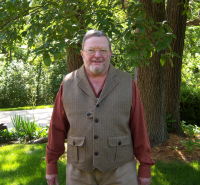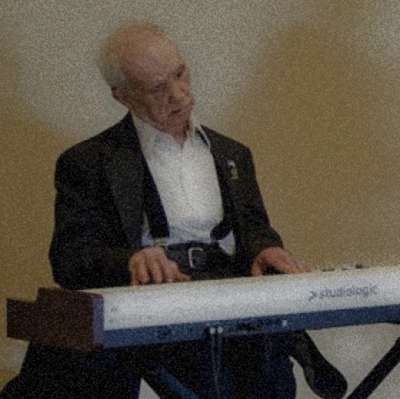Smoking an Old Meerschaum Pipe
by Alan Yount
“For Billie Holiday, And My Dad, Listening To Her During W.W. Two ”
*****One*****
when I was going through a box
of my dad’s things, from the war,
I found his
old meerschaum pipe.
he was in the navy in new york city
and he worked on the u.s.s. missouri.
he was actually on
the first sailing of that ship.
while in the city, he heard
all the dance bands, that came to town
and many other musicians
that came around to play.
*****Two*****
back at home
when I was young
I remember in particular
he would pull out a seventy-eight
of billie holiday singing, “uptown blues,”
which he had heard, in the city.
it was john hammond”s first,
recording for “the harlem river line.”
*****Three*****
I also remember my dad …
while listening:
he was striking a match / then puffing
his pipe, made of meerschaum
(meaning sea foam
which was from the mediterranean).
it had an antique
cherrywood stem,
& bowl with a patina
from years of smoking.
watching the tobacco
starting to burn …
there was … a slight hissing:
& smoke rising.
*****Four*****
billie’s singing voice
was wonderful.
she was singing the words, “what a little
moonlight can do, for you.”
he was for sure
thinking of her,
and new york city, and being
in his apartment during the war.
*****Five*****
curious how far the pipe’s
comfort, comes from …
curling slow shaping smoke
the very metaphor
of meditation.
all the time
while listening
to billie holiday’s jazz music …
both, blended together
as one.
_____

Alan Yount lives on the north bank of the Missouri River, just south of Columbia, Missouri, and has taken poetic inspiration from boating and floating the river for many years. His poems have been published in a variety of publications, including Palo Alto Review, Roanoke Review, Spring…the Journal of E.E. Cummings Society, Apostrophe Magazine, Columbia College Journal of the Literary Arts, Modern Haiku, Pegasus Review, and Tidepool Magazine. Alan also plays jazz trumpet, and has led his own dance band. He is a direct descendant of the famous frontiersman, Daniel Boone.











































I very much liked this heartfelt poem by Joan Donovan , So very touching and relatable..
I enjoyed both of John Stupp’s poems. They reminded me of when I was child and how different things were back then.
I especially love the ending line of this poem!
Enjoyed Robert Nisbet’s poem which captured the era and The Andrew Sisters.
I’m glad you enjoyed it, Aurora
Loved Alan Yount’s poem. My mother was a young teen during WWII,she loved Billie Holiday and so do
Robert Nisbet’s poem “Servicemen” is up to his usual high standards. The final line is especially powerful.
I’m glad you enjoyed it, Michael.
“I Got Lena To Sing To Me,” by Aurora Lewis, is a first-rate poem which captures the angst of military service during wartime, along with the pleasure and relief provided by great music.
Thank you so much Michael. Not being in the service and also not during wartime, I am so thankful that I was able to get my feeling across to my reader.
John Stupp’s “Carolina Shout” is powerful and moving.
Alan Yount’s poem “Smoking an Old Meerschaum Pipe” uses a careful attention to detail to tie together very disparate elements that come to fruition in the final stanza in a pleasing way for the reader.
Roger Singer’s “Barracks 231” — oh yeah. Very nice.
Both of Dan Smith’s poems are gentle in tone and attentive to detail. They capture fundamental truths about family relationships, and war’s effect on them.
Dear Mr. Newell:
Thanks for your kind words. I am honored to have my poems included with so many excellent poems.
“Sweet Pain” by Joan Donovan captures the power of loss, loss too personal to share.
For Aurora Davis. I think your poem on Lena really captured what you could say was the “singing tone,” on war. I have always enjoyed your poems with JJM. Thanks for your comment on my poem.
Alan, thank you for enjoying my poems. I also enjoy yours.
For Michael L. Newell. I liked your poem. It caught the “spirit” of the crooners. Being a trumpet player I have all of Harry James albums. He and Frank make some great music together. Frank did his eulogy in Las Vegas. By he way, I got your two latest books. Several of the poems have stayed on my mind. Also I can’t quit thinking I wish I had come up with the title: “Traveling Without Compass or Map.” What a great overall metaphor and title!
Mr. Yount, I thank you for your kind words about my poem. I also thank you for your support of my books. Greatly appreciated. — MLN
Wonderful poems by all. I especially enjoyed Dan Smith’s poems here. Artful…and with a deep, tangible sincerity that can only come from having lived and having felt with the heart of a poet.
hey, thanks man. DCPH forever!!!